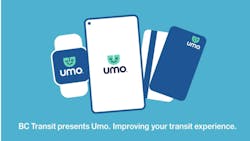BC Transit announces details of its coming electronic fare collection system
British Columbia Transit (BC Transit) will soon have a single electronic fare collection solution, making public transit a safer, more convenient option for its many local communities. BC Transit is bringing the Umo platform to more than 900 buses across more than 30 transit systems, increasing British Columbians’ access to transit.
Umo will replace end of life technology and equipment, and introduce contactless tap payment methods that will improve the transit experience. New payment methods will include mobile app, debit card, credit card, mobile wallet and reloadable smart card, providing riders with the ability to pick the best payment method for their lifestyle and travel habits.
“We are excited to be sharing news of the transformational electronic fare collection system project that will make selecting transit as your mode of choice more convenient and accessible,” said BC Transit President and CEO Erinn Pinkerton. “The innovative payment methods that will be enabled by the system are items that British Columbians carry on them every day. Whether someone is a daily rider, occasional rider, or haven’t taken their first trip yet, Umo will make their trip easier.”
The coming system also introduces a new stored value feature, providing riders with further abilities to select the best option for their travel needs. Riders using the mobile app and reloadable smart card will be able to load a stored value balance to their account to be drawn from as they ride, in addition to being able to purchase any of the existing fare products.
Riders will be able to easily purchase their desired fare product with their mobile device, through a new web portal or at a retailer and board the bus by simply scanning their mobile device or tapping their card. Cash will continue to be accepted for those riders who prefer to use it, but it is expected most riders will find one of the new payment methods a more convenient option.
Other benefits of the electronic fare collection system will include:
- Enabling seamless interregional transit by allowing riders to travel across the province with one payment method.
- Improving onboard cleanliness by reducing farebox touchpoints with the implementation of contactless payments.
- Improving service reliability by reducing the demand on transit operators to visually validate and administer fare products aboard the bus.
- Increasing ridership by utilizing the electronic system’s tools to administer promotions and new programs.
“Modernization initiatives like this are important as we look to rebuild ridership to pre-pandemic levels and grow our public transportation system in the years to come,” said Rob Fleming, British Columbia Minister for Transportation and Infrastructure. “With the use of cash in sharp decline everywhere, efficient and convenient electronic fare payment options are the way of the future.”
The new system will be implemented in transit systems and interregional routes in two phases, initially enabling mobile app and reloadable smart card payment methods before payment by credit card, debit card and mobile wallets will be enabled. The Victoria Regional Transit System has been selected for the system’s pilot project and first transit system implementation and can expect to see the system come on board by fall 2022.
The full list of other transit systems and interregional routes scheduled for system implementation can be found on BC Transit’s website.
After a successful negotiated request for proposals process, BC Transit entered into an agreement with Cubic Transportation Systems, Inc. (Cubic) for its Umo platform. Cubic will bring nearly 20 years of experience supporting fare collection in British Columbia to the project as the long-time vendor for TransLink’s Compass Card network, used in Metro Vancouver.
The Electronic Fare Collection System Project is funded through the Investing in Canada Infrastructure Program. This project is being cost-shared with the Government of Canada contributing 50 percent of eligible costs, the Province of British Columbia contributing 40 percent and the project’s local government partners contributing the remaining 10 percent. The total cost for this project is C$23.2 million (US$18.2 million).
About the Author
Mass Transit Staff Report
Stories under this byline were produced through a team effort by the editorial staff of Mass Transit.
To learn more about our team, click here.
If you have a story idea, let us know by emailing [email protected]. Please review our contributor guidelines found here.
